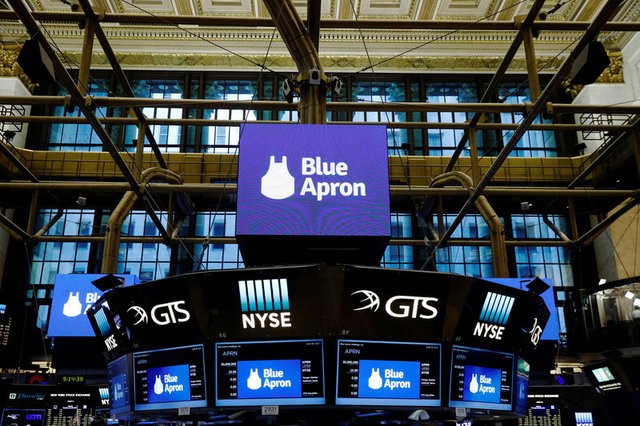By Lauren Hirsch
(Reuters) - The downsized initial public offering of Blue Apron Holdings Inc (N:APRN), the first U.S. meal-kit company to go public, may have disappointed venture capital investors, but food companies with stakes in the sector may still see returns in the form of insight into changing eating habits.
The meal-kit investments have come as out-of-favour brands, increased competition and pricing wars among grocers weigh on sales and profitability at the biggest food companies.
The packaged food companies hope that the new and growing meal delivery industry, with its detailed consumer preferences data and feedback, will help big brands reconnect with young shoppers who have moved to new distribution channels or abandoned staple labels for fresher, healthier or speciality items.
Campbell Soup Co (N:CPB), the 148-year-old Camden, New Jersey-based packaged food manufacturer best known for its canned soups, last month invested $10 million (7.67 million pounds) in El Segundo, California-based Chef'd LLC, a Blue Apron competitor that allows users to personalize meal-kits with branded pairings.
Even if Blue Apron and its competitors struggle to make their model profitable and attractive to public markets, Mark Alexander, who oversees Campbell's digital and e-commerce initiatives, expects benefits from the relatively tiny investment for $16 billion Campbell.
"Meal kits may not turn into the biggest thing, and I think even if they don't, we would have learnt a lot about consumer shopping, food preferences, what consumers like about bundled services and what they don't like," Alexander said in an interview earlier this week.
Campbell has struggled with weakening demand for its core products, and warned in May that its full-year sales could decline.
Blue Apron, the biggest meal-kit delivery company, was forced this week to accept a valuation and public offering that were about a third smaller than it hoped, after investors expressed concerns about its lack of profitability, marketing costs and the impact of Amazon.com Inc's (O:AMZN) $13.7 billion deal earlier this month to buy U.S. grocer Whole Foods Market Inc (O:WFM).
Blue Apron shares last traded around $9.45 on Friday, below their $10 IPO price, giving the company a market capitalisation of around $1.8 billion, less than the $2.2 billion valuation of its latest private fundraising round two years ago.
While the vast majority of investments in meal-kit companies, totalling $1.4 billion in 2016, came from venture capital firms hoping to reap big profits as these startups expand, a tiny fraction came from big food companies.
Nestle SA (S:NESN) led a $77 million investment round in Freshly in June, while Unilever Plc's venture capital arm (L:ULVR) led a $9.2 million investment in Sun Basket in May.
Blue Apron does not have any investment from a major food company.
While Amazon's splashy bet on Whole Foods sent jitters across the food retail sector over its potential to revolutionise the e-commerce company's reach, the investments in meal-kit delivery companies are a way for major companies to carry out smaller-scale experiments as consumers move to buying food online.
Just 23 percent of Americans buy groceries online, but that share is expected to more than triple in under 10 years, according to data provider The Nielsen Company.
"I think Nestle and other consumer packaged good companies said we want to be part of this new industry and understand more in-depthly how it affects our business," said Freshly Chief Executive Michael Wystrach.
DATA LABS
Meal delivery companies rely on online registration for their services. Customers can provide feedback on the meals and information on their preferences, representing a valuable data trove that can be used to develop targeting advertisement.
"We can ask people questions to help them find items and collect data that is individual and granular. That data is different than the demographic data (at supermarkets) because it can tell us more, such as a person's lifestyle, cooking habits or allergies," said Chef'd CEO Kyle Ransford.
To be sure, meal-kit investments by big food companies are in their infancy, and the value they can offer as consumer data labs is unproven. Supermarkets have also been tracking shopping habits for years, with varying degrees of success.
And as Blue Apron's IPO shows, investors are concerned about how sticky the meal-kit subscription models actually are, raising the risk of consumers moving on to the next food trend before providing enough data to be meaningful.
Still, the delivery services offer a venue to quickly test new products and ideas, in contrast to lengthy and often costly focus groups usually used by big consumer companies.
"We have real-time response to the consumers; what do they like, what do they buy rapidly, and what should we make rapidly. It is a real-time test market," said Campbell Soup's Alexander.
